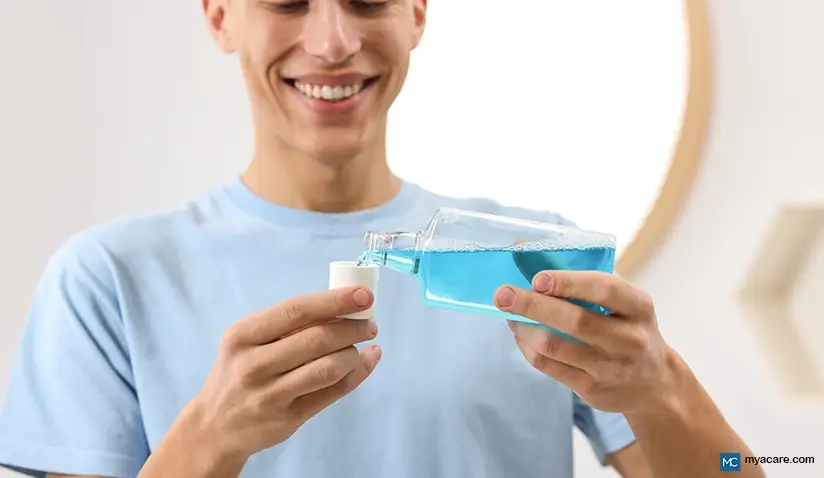Should You Start Using Mouthwash Every Day?

Conditions that Require the Use of Mouthwash
Disadvantages of Using Mouthwash
Oral mouthwash is steadily gaining popularity worldwide. The spike in the awareness of oral hygiene during the pandemic has further increased its demand. According to reports, the mouthwash market is projected to grow from 5,980 million USD in 2019 to 9,272 million USD during 2020-2027 at a compound annual growth rate (CAGR) of 5.7%.
Mouthwashes (or mouth rinses or oral rinses) are used to prevent and treat several oral conditions such as tooth decay, tooth erosion, bad breath, and gum infections, and restore oral health. According to the American Dental Association (ADA), mouthwash reaches areas in the mouth that are not easily accessed by a toothbrush. However, it should only be used in addition to brushing and not as a replacement.
In this article, we help you understand all about mouthwashes, their use, and their side effects.
What are the Different Types of Mouthwash?
According to American Dental Association (ADA), there are two main types of mouthwash:
- Therapeutic mouthwashes: These mouthwashes contain active ingredients that kill microorganisms and reduce the inflammation of gums, cavities, and bad breath. For instance, chlorhexidine mouthwash aids in the reduction of gum inflammation, bleeding of gums, and bad breath.
- Cosmetic mouthwashes: These mouthwashes reduce bad breath and leave a pleasant smell in the mouth for a short time. However, these mouthwashes have limited effect against microorganisms that cause cavities or gum infections.
What is the Composition of Mouthwash?
Mouthwashes consist of a mixture of one or two of the following active ingredients in each category:
- Antimicrobial agents such as Chlorhexidine, Cetylpyridinium chloride, and Triclosan
- Antiplaque agents such as Zinc acetate, Zinc chloride, Zinc citrate, Zinc gluconate, and Zinc hydroxyapatite
- Water and/or alcohol such as Ethanol, Glycerine, and Propylene glycol
- Essential oils such as Thymol, Menthol, Eucalyptol, Methyl salicylate, and Tea-tree
- Surfactants such as, PEG-40 hydrogenated castor oil, Sodium lauryl sulfate
- Sweeteners such as Saccharin, Sorbitol, Xylitol, Maltodextrin, Fructose, Isomalt
- Preservative such as Sodium benzoate, Methylparaben, Phenoxyethanol, and Potassium sorbate
- Anti-caries agents such as Sodium fluoride, Potassium fluoride, Stannous fluoride, and Calcium fluoride
- Flavoring and coloring agents
What are the Clinical Conditions that Require the Use of Mouthwash?
Here are some of the conditions that require the use of mouthwash.
- Gingivitis: The use of mouthwashes with active ingredients such as cetylpyridinium chloride (e.g., Colgate® Plax, CREST®PRO-HEALTH TM, ACT® Total-CareTM), chlorhexidine (e.g., PeridexTM 3MTM, Periogard®), and essential oils (e.g., Listerine® Antiseptic) help reduce the deposition of plaque and tartar on the tooth surfaces in addition to brushing. This results in a reduction in gingivitis, an initial form of gum disease.
- Bad breath: Bacteria in the mouth break down food, resulting in the release of volatile sulfur compounds. These volatile sulfur compounds contribute to bad breath. Therapeutic mouthwashes with antimicrobial properties can help limit the growth of bacteria that causes bad breath. However, the prolonged use of these mouthwashes has side effects.
- Dry socket: Dry socket is a condition that may occur due to the dislodgement or failure of a blood clot to develop in the socket after the tooth extraction (removal). The patient usually experiences severe pain and discomfort. The use of antiseptic mouthwash such as chlorhexidine helps in better healing and lowers the risk of dry sockets after tooth removal.
- Tooth decay: The use of fluoride-based mouthwash imparts strength to enamel and aids in the remineralization (repair) of initial tooth decay.
- Tooth sensitivity: The use of mouthwashes with Potassium Nitrate and Sodium Fluoride as major ingredients reduces tooth sensitivity.
- Topical pain relief: The use of mouthwash that contains ingredients such as lidocaine, benzocaine/tetracaine hydrochloride, dyclonine hydrochloride, or phenol instills an anesthetic effect and provides relief from pain due to oral ulcers or other lesions.
- Tooth whitening: Mouthwashes that contain ingredients such as carbamide peroxide or hydrogen peroxide help in the removal of stains present on the external surface of teeth, causing whiting of teeth. These mouthwashes should only be used on the dentist’s recommendation. e.g., Colgate® Optic White®, CREST® 3D WHITE
- Dry mouth: The reduction in the flow of saliva aids in the dryness of the mouth, also known as xerostomia. Prolonged dryness of mouth increases the risk of decay and gum-related infections. To overcome this, alcohol-free mouthwashes containing agents that replicate the composition of saliva (e.g., enzymes, cellulose derivatives, mucins) are recommended.
- Pre-procedural rinse: The use of therapeutic mouthwash in dental clinics before dental procedures helps reduce the bacterial load in the mouth. Besides, aerosols generated while using dental equipment (e.g., scalers, airotor, handpieces, air polisher) are rich in microorganisms and remain in the air for hours. The use of mouthwash before the procedure reduces the number of microbes filled with aerosols in the clinical setting.
What are Recommended Mouthwashes for Different Oral Conditions:
Here are some recommended mouthwashes for different oral conditions:
- Tooth decay and tooth sensitivity: Mouthwash that contains Fluoride
- Bad breath: Mouthwash with cetylpyridinium chloride or essential oils
- Gum diseases: Mouthwash with cetylpyridinium chloride, chlorhexidine, or essential oils
- Dry mouth: Alcohol-free mouthwash
- Mouth sores: Alcohol-free mouthwash with Benzydamine hydrochloride or similar compounds.
- Tooth whitening: Mouthwash with peroxides
What are the Disadvantages of Using Mouthwash?
Here are some of the disadvantages of using mouthwashes:
- The excess use of mouthwash containing chlorhexidine or cetylpyridinium chloride may cause staining of teeth, tongue, fillings, or dental crowns.
- Prolonged use of chlorhexidine, triclosan, and essential oil based mouthwash can alter the taste sensations and cause irritation or burning sensation in the oral mucosa (soft tissue lining the oral cavity).
- The excess use of fluoride-based mouthwash is associated with oral ulceration and discoloration of teeth.
- Delmopinol mouthwash may lead to staining of teeth, numbness, and altered taste sensation.
What Precautions Should be Taken While Using Mouthwash?
Here are some of the precautions that should be taken while using mouthwash:
- Mouthwashes, especially therapeutic ones, should be used as directed by a dentist (dosage, frequency, and time).
- Missed doses of mouthwash should not be compensated by doubling the dose of mouthwash.
- The use of mouthwash is usually not recommended in children below 6 years of age as they may swallow it.
- Check for the ADA (American Dental Association) seal of acceptance on mouthwash before buying them. The presence of an ADA seal signifies that the product is safe and effective.
- Mouthwash should be used along with brushing and flossing to keep your teeth and gum healthy. However,it should not replace brushing and flossing.
- A gap of 20-30 minutes should be maintained between brushing and mouthwash use. This is because the immediate use of mouthwash after brushing can form a complex concoction of different ingredients and lower the effectiveness of mouthwash.
Should You Start Using Mouthwash Every Day?
Mouthwash is recommended twice daily after brushing and flossing. It serves as an additional aid to maintain oral hygiene. Mouthwashes that help to freshen the breath or maintain oral hygiene can be used regularly. However, mouthwash used to treat specific oral conditions should be used only on dentists’ recommendation for a prescribed time only.
To search for the best dentists in Germany, India, Malaysia, Poland, Singapore, Spain, Thailand, Turkey, the UAE, the UK and the USA, please use the Mya Care search engine.
To search for the best healthcare providers worldwide, please use the Mya Care search engine.

Dr. Shilpy Bhandari is an experienced dental surgeon, with specialization in periodontics and implantology. She received her graduate and postgraduate education from Rajiv Gandhi University of Health Sciences in India. Besides her private practice, she enjoys writing on medical topics. She is also interested in evidence-based academic writing and has published several articles in international journals.
References:
Featured Blogs



